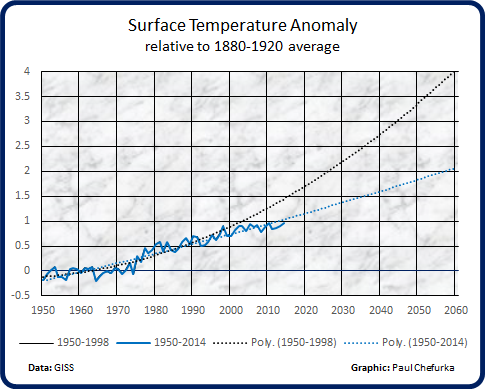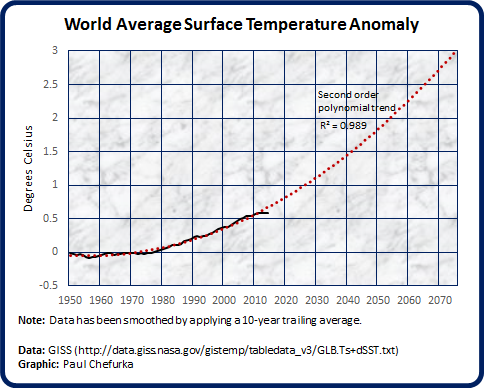Environment & Energy
Related: About this forumLeading scientists accused of offering false hope on climate
Leading climate scientists and advisors stand accused of giving the public false hope that dangerous levels of warming can be averted. That’s the view of Oliver Geden, a researcher at the Berlin-based German Institute for International and Security Affairs.
“Scientific advisers must resist pressures that undermine the integrity of climate science,” he writes. “Instead of spreading false optimism, they must stand firm and defend their intellectual independence, findings and recommendations – no matter how politically unpalatable.”
The 2C goal is viewed as politically delicate. When US climate envoy Todd Stern argued it was impractical in 2012 he was met with stiff criticism from developed and developing countries. In March this year Petra Tschakert, a coordinating lead author of the Intergovernmental Panel on Climate Change’s latest assessment said it was “utterly inadequate”.
Its last set of reports, issued between 2013 and 2014, warned if countries continues to burn fossil fuels at their current rate the world could lock in 2C of warming in under 30 years’ time.
I hope a few more people in high places are beginning to understand that the world is going to blow through +2C like a blowtorch through butter, regardless of the renewable energy policies of Denmark and Iceland...
truebrit71
(20,805 posts)I have been saying for a long while that the projections are way too conservative.... seems I was right....
Kelvin Mace
(17,469 posts)"When the avalanche has started, it is too late for the pebbles to vote"
- Kosh
Binkie The Clown
(7,911 posts)People have to be reminded of this over and over until it sinks in.
Scootaloo
(25,699 posts)Okay, we can switch to solar.
We're still going to mine and refine all that copper, all those rare earth minerals. In fact we will have to increase them beyond exponentially to make up for just current demand. Wind? same problem. Tidal? Yup.
So, we're ramping up vast destruction against the rest of the world in order to avoid adding to the CO2 levels. Of course, all this ramping up to create the new infrastructure will have to be petro-based... meaning that oops, we're still cranking that stuff out like it's going out of style.
At current population and consumption levels we are using 1.5 earths worth of resources. This is a problem, even without climate change (which is, of course a huge problem.) As the population keeps increasing, as affluence (and thus consumption) increases, we string ourselves even further out.
There is no magic pill. There is no tech breakthrough that will save us. We are simply going to face a civilizational collapse, followed by a lot of people dying - dying of environmental damage, dying of thirst and hunger, and of course dying of armed conflict with each other. There will probably be a nuclear exchange over this in the not-too-distant future. And the awful thing is? it'll just be One More Damn Thing on top of everything else. Seriously we're almost to the point where nuclear fallout could be considered just one more in a list of problems. It's a little unsettling, isn't it?
OKIsItJustMe
(19,937 posts)Not necessarily...
https://en.wikipedia.org/wiki/Organic_solar_cell
Scootaloo
(25,699 posts)What is the wire that carries the charge made of? What is the battery that stores the charge made of? What is it powering, exactly, and what is it made of?
Industrialization is innately unsustainable. It relies entirely of infinite exploitation of finite material within a very finite sphere.
OKIsItJustMe
(19,937 posts)Industrialization, at this point, is a fact of life.
Is it sustainable? It can be.
Scootaloo
(25,699 posts)It's a fact of life, you're right. Ho much longer will that last? it demands constant growth, eternal expansion, and we just on't have that many planets to feed to it. Even if we did, should we want to? it's NOT sustainable. There is nothing at all sustainable about it. It is a purely consumptive process, you cannot put everything back. The materials are not renewable, the toxins used are there for good, the impact is permanent.
It's a pollyanna delusion that, "oh, maybe we'll invent something to make everything better!" - might as well hope for perpetual motion for the world's energy needs. There is no cure. it's terminal. The question now isn't how to "stop it" and it's certainly not "how do we stop it while keeping on doing what we were doing anyway?"
The question is, what can be done to minimize harm and ensure the best chances for survival for us and pretty much everything else on this world, as soon as possible? 'Cause shit is going to get very real, very soon. it already is, in many places in the world - ironically usually the places that have done the least to cause the problems.
OKIsItJustMe
(19,937 posts)Our culture may...
Scootaloo
(25,699 posts)yes, first off, industrialization does demand it - without a constant feed of resources, it stops.
Second, our civilization revolves around this. It transcends culture. Simply put we have a global industral civilization.
OKIsItJustMe
(19,937 posts)We can run industry off recycled goods. We have not done that.
Systematic Chaos
(8,601 posts)Please give us your exact plan for how we're going to run all of the planet's current industry without any further increases in atmospheric CO2, and all done with recycled goods. Because just one isn't enough; we need both if we expect to have any hope of future survival as a species.
So go on! This is your chance to save humanity!
Gregorian
(23,867 posts)Humans grow when they're fed, like any biological process. We found a bunch of oil in Saudi Arabia, and we grew to 7 billion. Our economic system, which is tied to our growth is predicted to slow rapidly in the not too distant future, according to an article I posted a couple of days ago. Things are going to slow down. It was an interesting time for sure. Now it's a matter of how fast it happens. Forecasts predict fast.
LouisvilleDem
(303 posts)2C in 30 years time.
That would require temperatures to rise at a rate of 0.66C per decade. For the past 30 years we've only been seeing temperature rises in the 0.15 to 0.22 per decade range--more than 3 times what we have ever observed. When exactly is this catastrophic warming supposed to kick in, because until I see that happen I believe there is cause for optimism.
GliderGuider
(21,088 posts)Last edited Sat May 9, 2015, 09:10 PM - Edit history (1)
Here's a look at the surface temperature anomaly trend lines over two data ranges: 1950 to 1998, and 1950 to 2014.

Keep in mind that between 1998 and 2014 much of the added heat was going into the oceans, and many climate scientists expect it to start coming back out shortly. If the surface temperature anomaly had maintained the rate of increase it had up to 1998, the trend would have reached +2C by 2025. If the current trend were to continue, we wouldn't reach +2 until 2060.
Two factors favour a higher rather than a lower trend: the potential for heat release from the oceans; and increasing atmospheric CO2 concentrations. Also, the inherent unpredictability of the trends over the short term could just as easily produce a higher rather than a lower trend. It doesn't look to me like +2C by 2030 is at all unrealistic.
Data source: http://data.giss.nasa.gov/gistemp/tabledata_v3/GLB.Ts+dSST.txt
GliderGuider
(21,088 posts)This graph uses the same NASA GISS dataset as the graphs above, using the data series from 1940 to 2014 (i.e. I didn't try to remove the impact of the shift towards more oceanic heat absorption in 1998.) I applied a 10-year trailing average to the data, on the assumption that the year-to-year fluctuations are less significant to climate change than the underlying trend.

As noted on the graph, the curve fit for the projection is a second-order polynomial. The R² value of 0.989 indicates that the trend is a very tight fit to the actual data.
One other important fact is that the data set indicates an anomaly of 0C in 1945, which indicates that it is not normalized to pre-industrial temperatures. If this is done, the projected temperatures are 0.3C higher than shown.
This assessment is only based on past data. If the methane feedback loop becomes a serious problem, then future temperature increases could be greater than shown.
IMO there is only a very low probability that the rise will be less severe. That's because the CO₂ already in the atmosphere will keep temperatures rising for a very long time, and also because the global economy is likely going to shift away from fossil fuels only gradually, so CO₂ concentrations will continue to increase for a number of decades.
It looks to me as though we are locked into a rise of +4 or +5C, no matter what we do at this point.
LouisvilleDem
(303 posts)Do the exact same thing you did above, except that instead of using 1940-2014, use the period 1880-1944.
I dare you to post it, but I doubt you will.
GliderGuider
(21,088 posts)Curve fitting works just fine for prediction in situations where the underlying trend being fitted is expected to continue into the future.
Oddly enough, our current situation closely resembles the evolution of the period from 1950 to today. Is there any chance we will stay with the carbon regime we have today over the next few decades? Yes indeed. Is there any chance we will abruptly go back to the carbon situation of 1880 to 1944? Not a freaking chance.
That's why I chose the period I did, not to make the numbers support my position.
LouisvilleDem
(303 posts)I asked why you felt that it was appropriate to use curve fitting to predict what future temperatures will look like, and you respond by saying it's appropriate when "the underlying trend being fitted is expected to continue into the future." That is circular reasoning plain and simple. My question is WHY do you think the trend will to continue into the future, especially when we have past examples of the trend NOT continuing into the future.